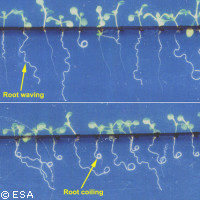European scientists test plant growth in outer space
The first experiment inside the European Columbus laboratory has got underway to investigate whether plants could grow in outer space. Dubbed WAICO ('Waving and coiling of Arabidopsis roots at different g-levels'), the experiment will look specifically at the impact of weightlessness on plant root growth. A wild and a genetically modified variation of the Arabidopsis plant have been chosen for the purpose of the experiment. These seeds will be allowed to grow at different levels of gravity over a period of 10 to 15 days under controlled temperature, light and humidity conditions. Of interest will be whether gravity has any effect on the spiralling and coiling of root growth, which is typically seen in plants growing on Earth. The results are expected to shed light on the feasibility of growing crops in space that would be nutritionally beneficial to astronauts during long voyages. In addition, the experiment will also help us better understand plant growth processes to improve agricultural crop efficiency back on Earth. Led by scientists from the Leibniz University Hannover in Germany, the experiment is making use of the Biolab of the Columbus laboratory. This facility is designed to support biological experiments on micro-organisms, cells, tissue cultures, small plants and small invertebrates. Using the video and telemetry equipment on board the facility, the scientists will document in real time how the roots grow. At the end of the experiment, a fixative will be introduced into the cultivation box to preserve the seeds so that they may be analysed further upon return to Earth. Launched in December 2007, the Columbus laboratory is the European Space Agency's (ESA's) biggest single contribution to the International Space Station. The 4.5-metre diameter cylindrical module, which is equipped with a wide range of research facilities, is expected to offer extensive science capabilities to scientists over the next period of 10 years.



